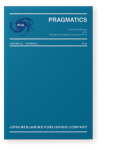Vol. 32:4 (2022) ► pp.620–647
Accounts as acts of identity
Justifying business closures on COVID-19 public signs in Athens and London
This paper investigates accounts justifying the closures of businesses found on public signs in Athens and London during the COVID-19 pandemic. The data for the study was drawn from a corpus of COVID-19-related public signage collected in the two cities during the first lockdown. The accounts used on these signs are analysed as acts of identity and, specifically, as discursive means deployed by the authors of the signs to project themselves and their businesses favourably. It is shown that the accounts used at the micro-level of discourse align to various degrees with the dominant discourses surrounding the pandemic at the macro-level and with the values these discourses draw upon. It is also shown that the accounts are used to reframe the public’s understanding of the closures and to construct identities congruent with the interests of the business owners, ensuring post-pandemic continuity.
Article outline
- 1.Introduction
- 2.Framework of the study
- 2.1Identity
- 2.2Dominant discourses of the COVID-19 pandemic
- 2.3Accounts and desirable identities
- 3.Method
- 4.Data analysis
- 4.1Category 1: It is the authorities
- 4.2Category 2: It is us
- 4.3Category 3: It is both
- 5.Discussion and conclusions: Identities, accounts and values
- Acknowledgements
- Notes
-
References
